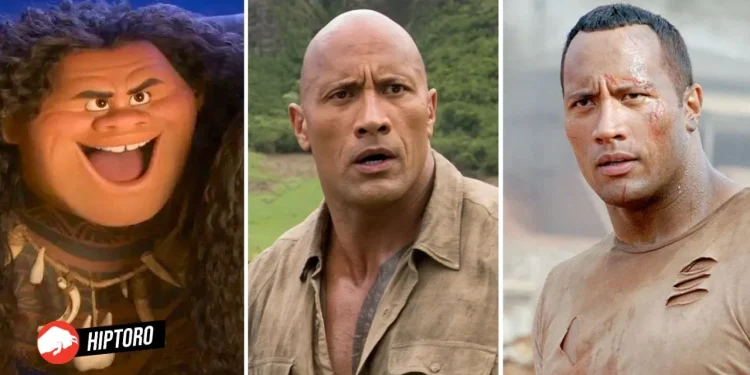Dwayne Douglas Johnson, widely known as “The Rock,” has cemented his place as one of the most charismatic and versatile figures in the entertainment industry. Born on May 2, 1972, in Hayward, California, Johnson’s journey from collegiate football player to one of the greatest professional wrestlers of all time, and ultimately, to a global Hollywood superstar, is a testament to his relentless work ethic, charismatic persona, and innate talent.
His Polynesian heritage, with roots in both Samoan and African American cultures, has played a significant role in shaping his identity and work, infusing his projects with a rich sense of diversity and authenticity.
His film career began with a role in “The Mummy Returns” (2001), setting the stage for a series of successful action and comedy films. Dwayne Johnson’s ability to carry both genres with equal prowess quickly made him a bankable Hollywood star.
Films like “Fast & Furious,” “Jumanji,” and “Moana” not only showcased his range as an actor but also his ability to connect with audiences of all ages. His commitment to fitness, evident in his formidable physique, has become a hallmark of his on-screen presence, often incorporated into his roles.
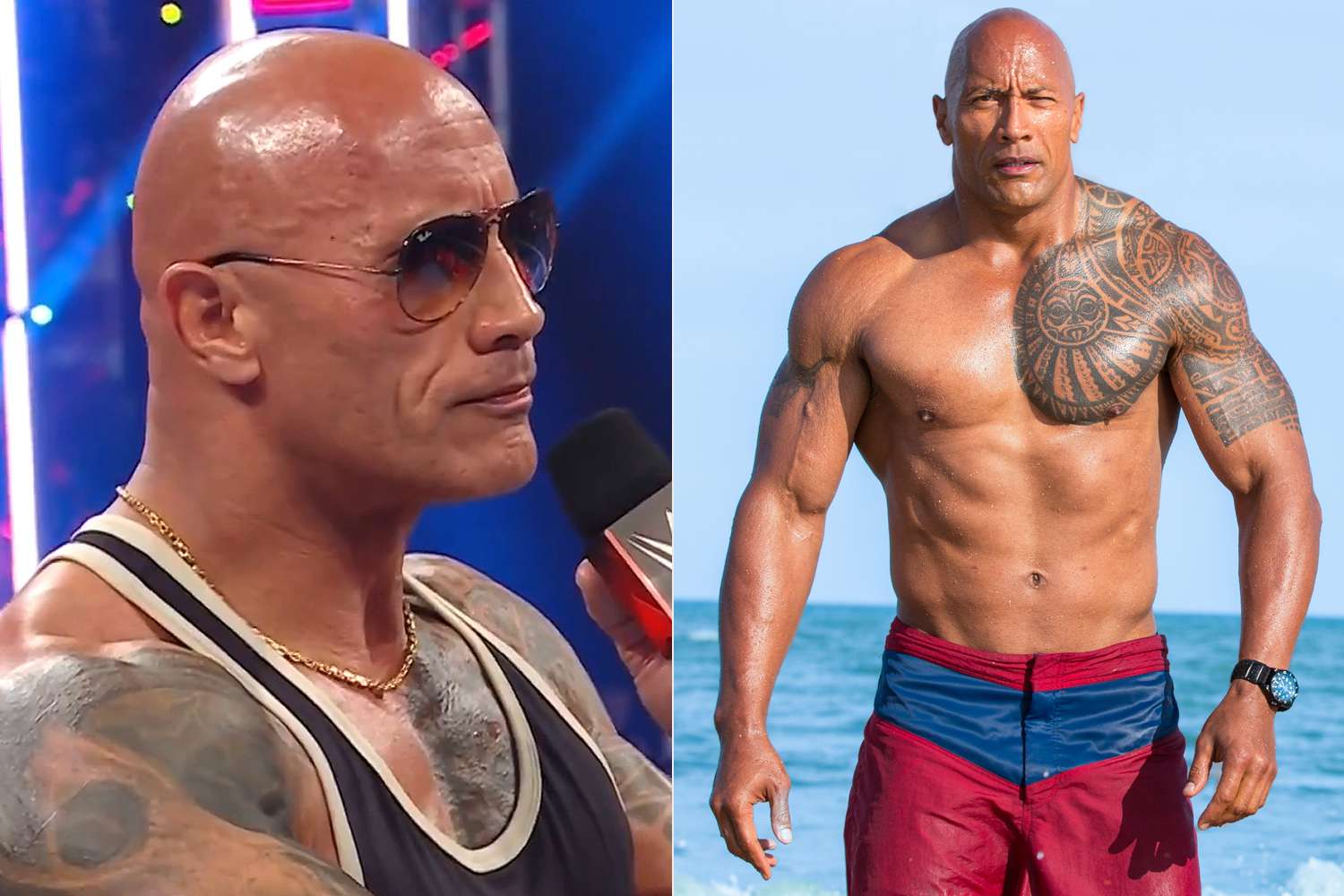
Beyond his entertainment career, Dwayne Johnson is known for his philanthropy, motivational initiatives, and business ventures, further solidifying his status as a multifaceted public figure.
With an infectious smile, boundless energy, and a genuine connection with his fans, Dwayne Johnson continues to dominate the entertainment landscape, proving that “The Rock” is not just a character but a symbol of perseverance, versatility, and enduring appeal.
Now, let’s proceed with a comprehensive analysis of the first movie on this list, “Jumanji: Welcome to the Jungle,” as our starting point.
Top 10 Best Movies of Dwayne Johnson
1. Jumanji: Welcome to the Jungle
Released in 2017, not only marked a significant milestone in Dwayne Johnson’s career but also revitalized a beloved franchise for a new generation. Directed by Jake Kasdan, this film cleverly reimagines the original 1995 “Jumanji” concept, transitioning from a board game to a video game, thereby reflecting contemporary technological advancements and gaming culture.
Dwayne Johnson stars as Dr. Smolder Bravestone, an intrepid archaeologist and the avatar chosen by Spencer, one of the four teens sucked into the game’s jungle world. Johnson’s portrayal of Bravestone is both humorous and heroic, showcasing his ability to blend comedy with action in a way that feels both effortless and engaging.
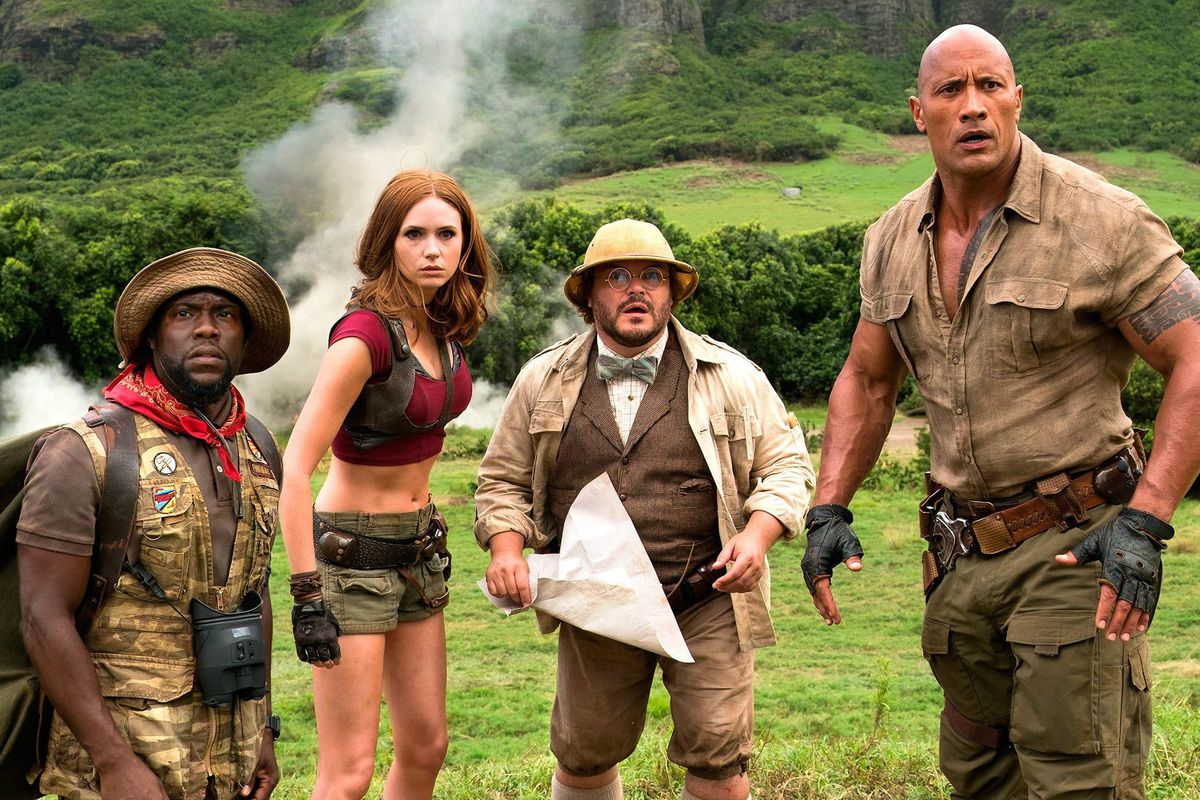
The narrative follows four high school students who, upon discovering an old video game console with a game they’ve never heard of, are transported into the game’s jungle setting and the bodies of their avatars. What they discover is that you don’t just play Jumanji—you must survive it.
To beat the game and return to the real world, they’ll have to go on the most dangerous adventure of their lives, discover what Alan Parrish left 20 years ago, and change the way they think about themselves—or they’ll be stuck in the game forever.
“Jumanji: Welcome to the Jungle” stands out for its inventive plot, vibrant visuals, and strong chemistry among its cast members, including Kevin Hart, Jack Black, and Karen Gillan, alongside Dwayne Johnson. The film’s success lies in its ability to balance thrilling action sequences with heartfelt moments and sharp wit, making it accessible and enjoyable for audiences of all ages.
Johnson’s role is pivotal in anchoring the film’s high stakes and comedic elements, proving his status as a leading man capable of carrying a blockbuster franchise.

Financially, the film was a juggernaut, grossing over $962 million worldwide, which underscored Dwayne Johnson’s bankability and the film’s global appeal. Critics praised the film for its fun, family-friendly adventure and its clever twist on the original concept, with Johnson’s performance receiving accolades for his charisma and comedic timing.
“Jumanji: Welcome to the Jungle” not only solidified Dwayne Johnson’s position as a Hollywood A-lister but also demonstrated his versatility as an actor who can navigate the demands of both action and comedy with equal proficiency.
2. “Fast & Furious 7” (2015)
Officially titled “Furious 7,” is a pivotal installment in the high-octane “Fast & Furious” franchise that not only pushed the boundaries of action cinema but also served as a touching tribute to Paul Walker, one of its beloved stars.
Directed by James Wan, known for his work in the horror genre, the film marks a departure into a realm where stunts defy gravity, camaraderie defines loyalty, and the line between right and wrong blurs at high speeds.
Dwayne “The Rock” Johnson returns as Luke Hobbs, a Diplomatic Security Service agent whose imposing presence and charismatic persona add a significant layer of intensity and humor to the saga.
“Furious 7” follows the crew as they return to the United States to live normal lives after securing amnesty for their past crimes in “Fast & Furious 6.”
However, their return to normalcy is short-lived when Deckard Shaw (Jason Statham), a rogue special forces assassin seeking revenge for his comatose brother, puts the team in his crosshairs.
This thrusts Dom (Vin Diesel), Brian (Paul Walker), and the rest of their family into a world of global terrorism and a mission to retrieve a tracking device known as the “God’s Eye,” which can locate anyone on the planet.
The film weaves through Tokyo, Abu Dhabi, and Los Angeles, showcasing heart-stopping action sequences that include skydiving cars, skyscraper jumps, and relentless street races.
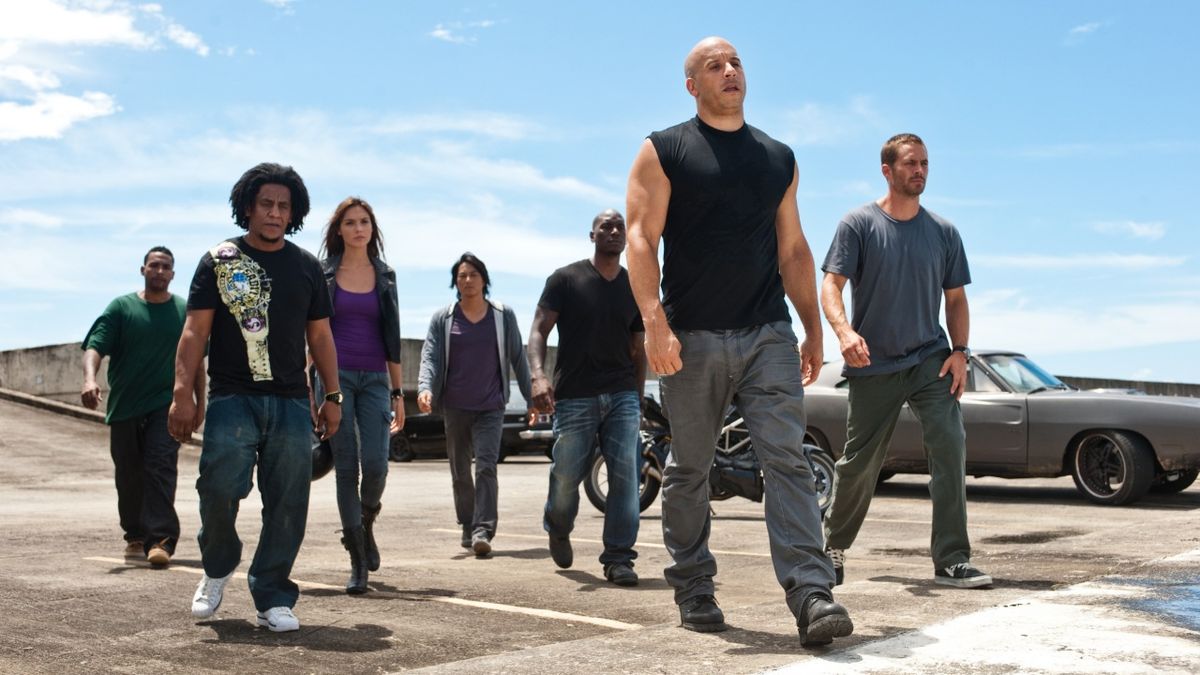
Dwayne Johnson’s role, though not as central to the plot as in some other installments, remains memorable for his sheer physicality and comedic timing. His character, Hobbs, provides pivotal support to the team, especially in the film’s climactic moments, reinforcing the themes of loyalty and family that are central to the series.
Dwayne Johnson’s performance, alongside the ensemble cast, contributes to a palpable sense of brotherhood and resilience, making “Furious 7” resonate emotionally with audiences worldwide.
The film’s production was marred by the untimely death of Paul Walker in a car accident in 2013, which led to significant rewrites and the use of CGI and body doubles to complete his remaining scenes. This tragedy cast a pall over the production, turning “Furious 7” into a heartfelt farewell to the actor.
The movie’s final scenes, featuring a montage of Walker’s journey throughout the franchise, coupled with the song “See You Again” by Wiz Khalifa and Charlie Puth, serve as a poignant goodbye to his character, Brian O’Conner. This tribute resonated deeply with fans and critics alike, adding a layer of emotional depth rarely seen in action films.
Commercially, “Furious 7” was a monumental success, grossing over $1.5 billion worldwide and becoming one of the highest-grossing films of all time. It showcased the global appeal of the franchise and its ability to draw audiences with its mix of high-stakes action, familial bonds, and a tribute to a fallen star.
Critics praised the film for its ambitious set pieces, emotional weight, and the seamless integration of Walker’s final performances, making “Furious 7” a standout entry in the franchise and a testament to its enduring legacy.

In summary, “Furious 7” is more than just an action-packed thrill ride; it is a heartfelt homage to Paul Walker, showcasing the franchise’s ability to evolve while staying true to its core themes of family and loyalty. Dwayne Johnson’s performance as Hobbs, alongside the ensemble cast, elevates the film, ensuring its place not only in the annals of action cinema but also as a poignant chapter in the “Fast & Furious” saga.
3. “Moana” (2016)
Disney’s animated musical adventure stands as a vibrant testament to the power of heritage and self-discovery, set against the sprawling backdrop of the Polynesian islands. Directed by Ron Clements and John Musker, the creative minds behind classics such as “The Little Mermaid” and “Aladdin,” “Moana” introduces audiences to a richly woven tapestry of myth, magic, and empowerment.
At the heart of this tale is Moana Waialiki (voiced by Auli’i Cravalho), the spirited daughter of a chief on the island of Motunui, who is chosen by the ocean itself to reunite a mystical relic with the goddess Te Fiti to save her people from a blight.
Dwayne Johnson lends his voice to the legendary demigod Maui, whose charisma and complexity add depth to the film’s exploration of themes such as identity, responsibility, and environmental stewardship.
“Moana” is celebrated for its departure from traditional Disney princess narratives, focusing instead on the title character’s journey of self-actualization and leadership. Moana is depicted not as a figure in need of rescue but as a capable and determined leader who challenges the conventions of her society to save her people.
This narrative shift is mirrored in Johnson’s portrayal of Maui, a character who evolves from a self-centered trickster to a supportive ally under Moana’s influence. Johnson’s performance, imbued with his characteristic charm and wit, brings a multi-dimensional quality to Maui, making him both a source of comic relief and emotional resonance.
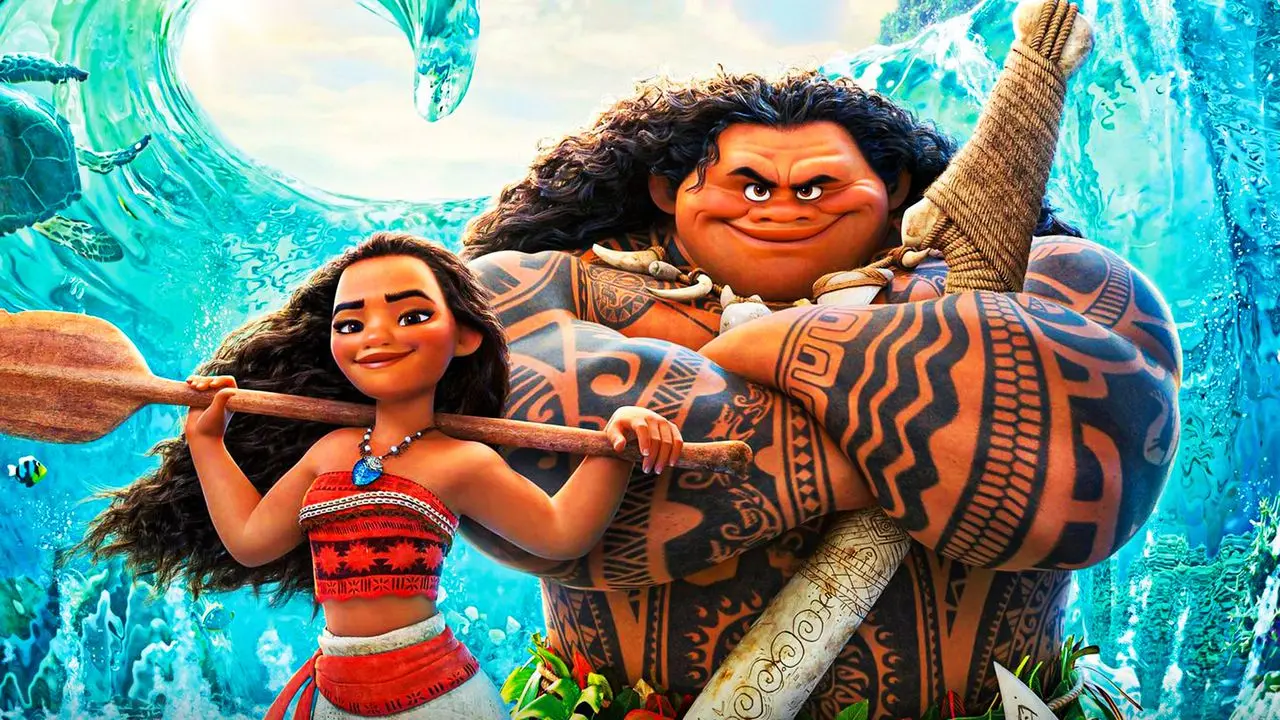
The film’s animation is a visual feast, capturing the lush landscapes and oceanic vistas of the Pacific Islands with stunning detail and vibrancy. This visual storytelling is complemented by a memorable soundtrack, which includes contributions from Lin-Manuel Miranda, Opetaia Foa’i, and Mark Mancina.
The song “How Far I’ll Go” serves as an anthem of Moana’s aspirations and determination, resonating with audiences worldwide for its message of pursuing one’s dreams despite obstacles.
“Moana” also stands out for its respectful portrayal of Polynesian culture, involving experts and consultants in its production to ensure cultural accuracy and sensitivity. This commitment to authenticity extends to the casting, with Auli’i Cravalho of Native Hawaiian descent, bringing an earnestness and depth to the role of Moana that enriches the film’s cultural grounding and emotional impact.

Commercially and critically acclaimed, “Moana” was lauded for its innovative animation, engaging story, and strong female protagonist. It grossed over $690 million worldwide, showcasing Disney’s continued prowess in creating compelling, visually stunning animated features that appeal to both children and adults. The film received numerous accolades, including nominations for Best Animated Feature at various award ceremonies, and its soundtrack achieved significant success, further cementing its impact on popular culture.
4. “The Fate of the Furious” (2017)
The eighth installment in the globally celebrated “Fast & Furious” franchise marked a significant turning point in the series, both in narrative scope and character dynamics. Directed by F.
Gary Gray, known for “Straight Outta Compton,” this chapter propels the saga into new territory, blending high-octane action with complex emotional underpinnings, as it delves into themes of betrayal, redemption, and the enduring strength of familial bonds.
Dwayne Johnson reprises his role as Luke Hobbs, the formidable Diplomatic Security Service (DSS) agent whose unwavering commitment to justice and loyalty to his makeshift family is tested as never before.
Set against the backdrop of a world where loyalty and trust are paramount, “The Fate of the Furious” begins with Dom (Vin Diesel) and Letty (Michelle Rodriguez) on their honeymoon in Havana, a setting vibrant with culture and street racing.
The serenity is shattered when a mysterious woman, Cipher (Charlize Theron), coerces Dom into betraying his team, setting off a chain of events that sees the family fractured and forced to confront an unprecedented threat from within.
As the team reels from Dom’s betrayal, they must rally together with unlikely allies, including their former adversary Deckard Shaw (Jason Statham), to stop Cipher and bring their family back together.
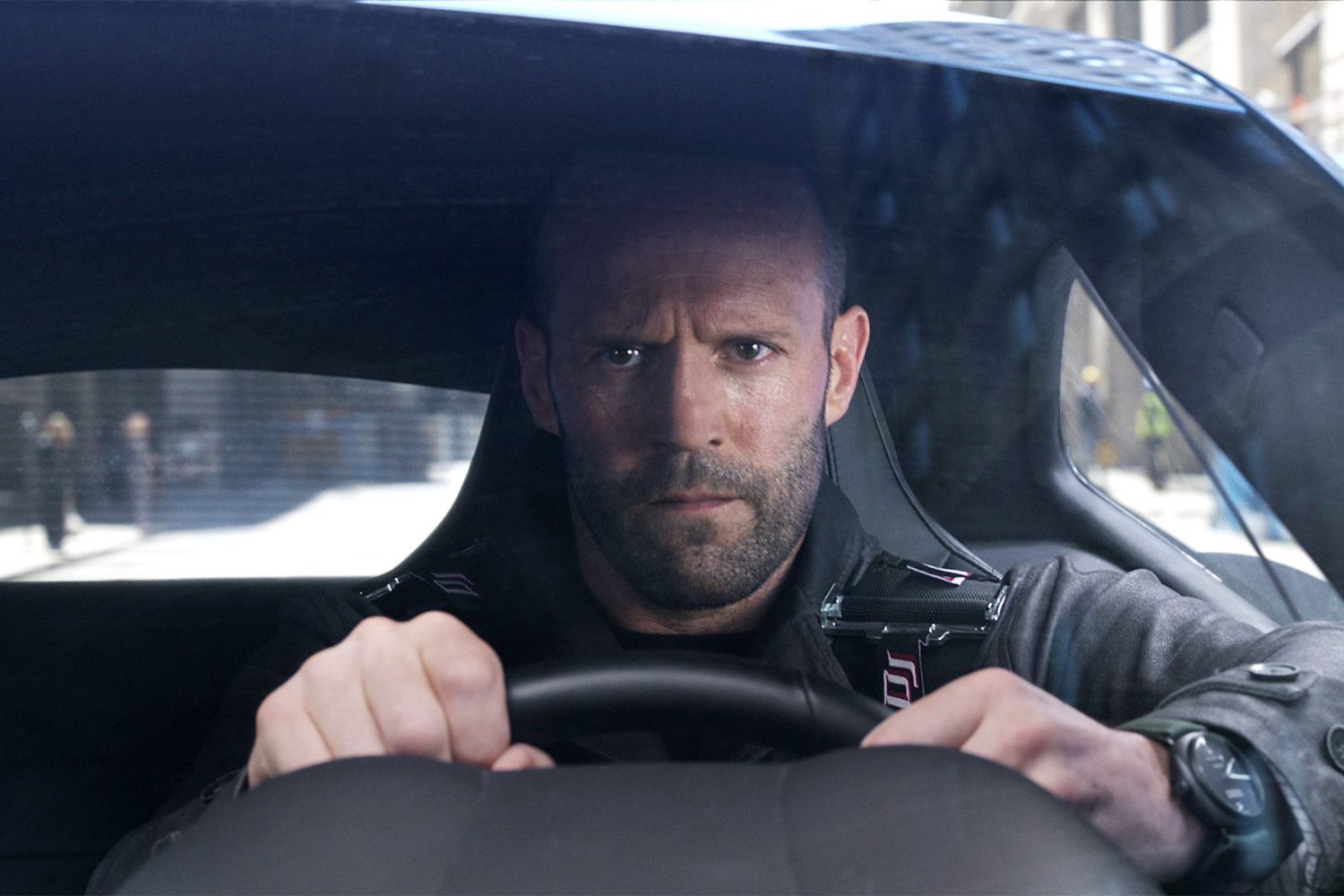
Dwayne Johnson’s Hobbs, once again, stands out with his larger-than-life persona, delivering a performance that balances brute strength with moments of humor and vulnerability. His dynamic with Jason Statham’s Shaw is particularly noteworthy, offering a blend of rivalry and respect that adds depth to their characters and injects a fresh dynamic into the franchise.
Johnson’s ability to convey both the physical intensity required for the action sequences and the emotional depth needed for the film’s more personal moments is a testament to his versatility as an actor.
“The Fate of the Furious” is renowned for its ambitious set pieces, which push the boundaries of action filmmaking. From a wrecking ball taking out a fleet of cars to a submarine emerging through the ice, the film delivers spectacle after spectacle, keeping audiences on the edge of their seats.
Yet, amidst the adrenaline-fueled chaos, the film weaves in a narrative about the importance of choice, loyalty, and the lengths one will go to protect those they consider family.

Financially, the film was a monumental success, grossing over $1.2 billion worldwide and solidifying the “Fast & Furious” franchise as a juggernaut of the action genre. Critics praised its inventive action sequences and the way it skillfully balanced its high-stakes drama with moments of levity and heart. The ensemble cast, including newcomers and series veterans, was lauded for their chemistry and ability to evolve their characters in meaningful ways.
5. “San Andreas” (2015)
San Andreas is a seismic disaster film that rumbles through the cinematic landscape with the force of a 9-magnitude earthquake, catapulting audiences into the heart of a devastating natural calamity that threatens the entirety of California.
Directed by Brad Peyton and anchored by Dwayne Johnson’s towering performance as Ray Gaines, a search and rescue helicopter pilot, this high-stakes thriller combines relentless action, cutting-edge visual effects, and a palpable sense of human resilience in the face of nature’s wrath.
Johnson’s portrayal of a man determined to protect his family amidst chaos adds a deeply personal layer to the spectacle, showcasing his range as an actor capable of delivering both physical intensity and emotional depth.
The narrative thrust of “San Andreas” centers on the aftermath of a massive earthquake that rips through California, originating from the infamous San Andreas Fault. Ray Gaines, who is estranged from his wife Emma (Carla Gugino) and daughter Blake (Alexandra Daddario), embarks on a perilous journey to save his family.
This odyssey takes him from the rubble of Los Angeles to the shattered streets of San Francisco, presenting him with unimaginable challenges and forcing him to confront his past failures as a husband and father.
Along the way, the film explores themes of redemption, courage, and the indomitable human spirit, all set against the backdrop of a landscape irrevocably altered by natural disasters.
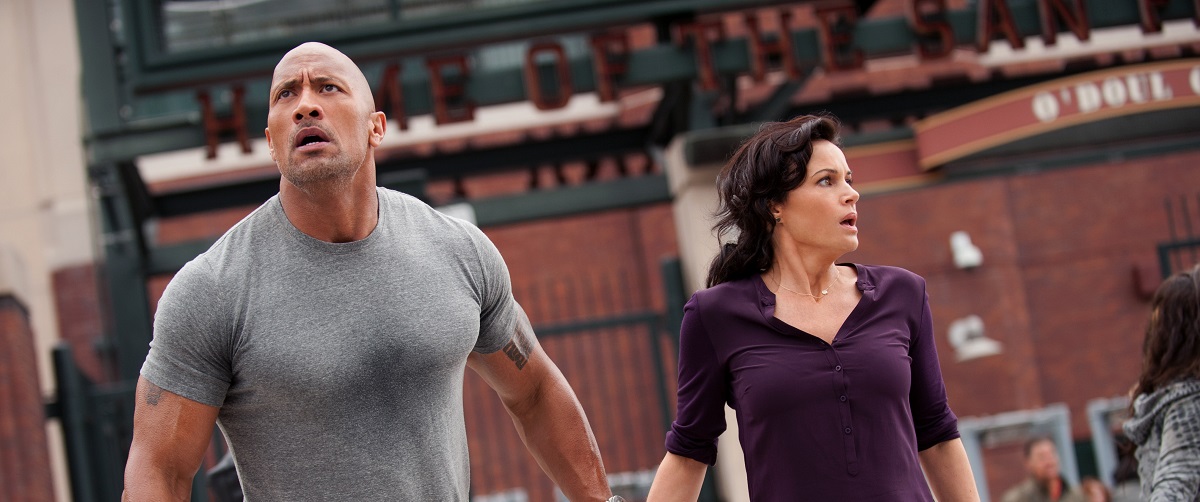
Dwayne Johnson’s role in “San Andreas” is emblematic of his ability to anchor blockbuster films with a mix of charisma, physical prowess, and emotional sincerity. His character, Ray Gaines, embodies the archetypal hero—brave, determined, and unwavering in his commitment to his family.
Johnson’s performance resonates with audiences not only for the adrenaline-fueled rescue sequences but also for the moments of vulnerability and determination in the face of overwhelming odds. His chemistry with co-stars Gugino and Daddario enhances the film’s emotional stakes, making the audience invest in their perilous journey to reunification.
Visually, “San Andreas” is a marvel of modern filmmaking, utilizing state-of-the-art special effects to render the earthquake and its aftermath with terrifying realism. The destruction of iconic California landmarks and the chaotic landscapes of a state in turmoil are depicted with painstaking detail, immersing viewers in the harrowing experience of the characters.
These technical achievements, combined with tight pacing and expertly choreographed action sequences, ensure that “San Andreas” delivers not just as a disaster movie but as a thrilling cinematic experience that keeps viewers on the edge of their seats.

Commercially, “San Andreas” was a resounding success, grossing over $474 million worldwide. It struck a chord with audiences seeking both the thrill of a disaster film and a story of human endurance and heroism.
Critics praised Johnson’s performance and the film’s special effects, though some noted the predictability of the plot. Nonetheless, “San Andreas” solidified Dwayne Johnson’s status as a leading man in Hollywood, capable of carrying a film both physically and emotionally.
6. “Central Intelligence” (2016)
Central Intelligence is a rollicking action-comedy that pairs the unlikely duo of Dwayne Johnson and Kevin Hart in a story that cleverly blends humor, heart, and high-octane action. Directed by Rawson Marshall Thurber, known for his adeptness at helming comedy hits, the film explores themes of friendship, redemption, and self-acceptance, all wrapped up in a plot brimming with espionage and intrigue.
Dwayne Johnson steps into the shoes of Bob Stone, a once-bullied geek who transforms into a muscular, charismatic, and somewhat eccentric CIA agent, while Kevin Hart plays Calvin Joyner, a former high school star now living an unfulfilled life as an accountant. The chemistry between Johnson and Hart is electric, providing the perfect foundation for a film that is as much about laughs as it is about delivering action-packed sequences.
The narrative kicks off with a high school reunion that catalyzes Calvin’s unexpected re-entry into Bob’s life. Bob, who harbors a deep gratitude towards Calvin for the kindness extended years ago, pulls him into a whirlwind of espionage under the pretense of needing his accounting skills to save the compromised U.S. spy satellite system.
What follows is a series of misadventures that test their physical and emotional limits, pushing the boundaries of their friendship and their self-perceptions. “Central Intelligence” shines in its ability to oscillate between moments of slapstick comedy and genuine emotional depth, a testament to the versatility of its leads and the sharpness of Thurber’s direction.
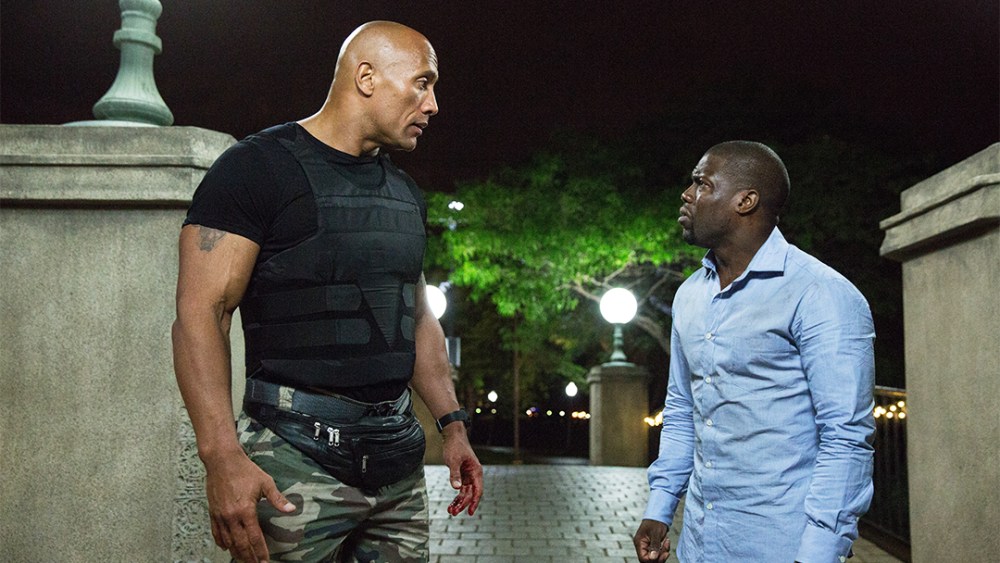
Dwayne Johnson’s portrayal of Bob Stone is a departure from his typical action-hero roles, allowing him to showcase his comedic timing and ability to play against type. His character, with a penchant for wearing unicorn T-shirts and carrying a fanny pack, is a delightful subversion of the macho persona that audiences have come to expect from him.
This role highlights Johnson’s range as an actor, demonstrating his capacity to elicit laughs while still convincingly playing a competent CIA agent. Kevin Hart’s Calvin Joyner provides the perfect foil to Johnson’s Bob Stone, delivering rapid-fire quips and expressions of disbelief that ground the film’s more outlandish moments in relatable humor.
“Central Intelligence” also succeeds in delivering a message about the lasting impact of high school on an individual’s self-esteem and the importance of overcoming past traumas.
Through its protagonists, the film addresses the consequences of bullying and the transformative power of kindness and friendship. This thematic depth, coupled with the film’s comedic and action elements, ensures that “Central Intelligence” resonates with a wide audience, offering more than just escapism.

Commercially, the film was a success, grossing over $217 million worldwide and proving the box office appeal of both Johnson and Hart. Critics praised the film for its lead performances, particularly the dynamic between the co-stars and its effective blend of comedy and action. While some aspects of the plot were noted as predictable, the film’s heart and humor were largely seen as compensating for its conventional narrative beats.
7. “Hobbs & Shaw” (2019)
Officially titled “Fast & Furious Presents: Hobbs & Shaw,” is a high-octane spin-off from the juggernaut “Fast & Furious” franchise that puts the spotlight on two of the series’ most charismatic characters.
Directed by David Leitch, known for his work on “Deadpool 2” and “Atomic Blonde,” the film pairs Dwayne Johnson’s Luke Hobbs and Jason Statham’s Deckard Shaw in an unlikely alliance that combines brute force, tactical precision, and a hefty dose of humor to save the world from a dire threat.
This action-packed buddy cop film explores themes of family, loyalty, and redemption, all while delivering the franchise’s signature blend of breathtaking action sequences and globe-trotting adventures.
Set against the backdrop of a bio-threat that could alter humanity forever, “Hobbs & Shaw” introduces Brixton Lore (Idris Elba), a cyber-genetically enhanced terrorist who presents a clear and present danger not just to the titular duo but to the world at large. Brixton’s abilities make him an almost invincible adversary, setting the stage for a showdown that pushes Hobbs and Shaw to their limits.
The film cleverly navigates the dynamics of its lead characters, who are initially at odds due to their contrasting personalities and methods but gradually find common ground in their shared commitment to justice and the protection of the vulnerable.
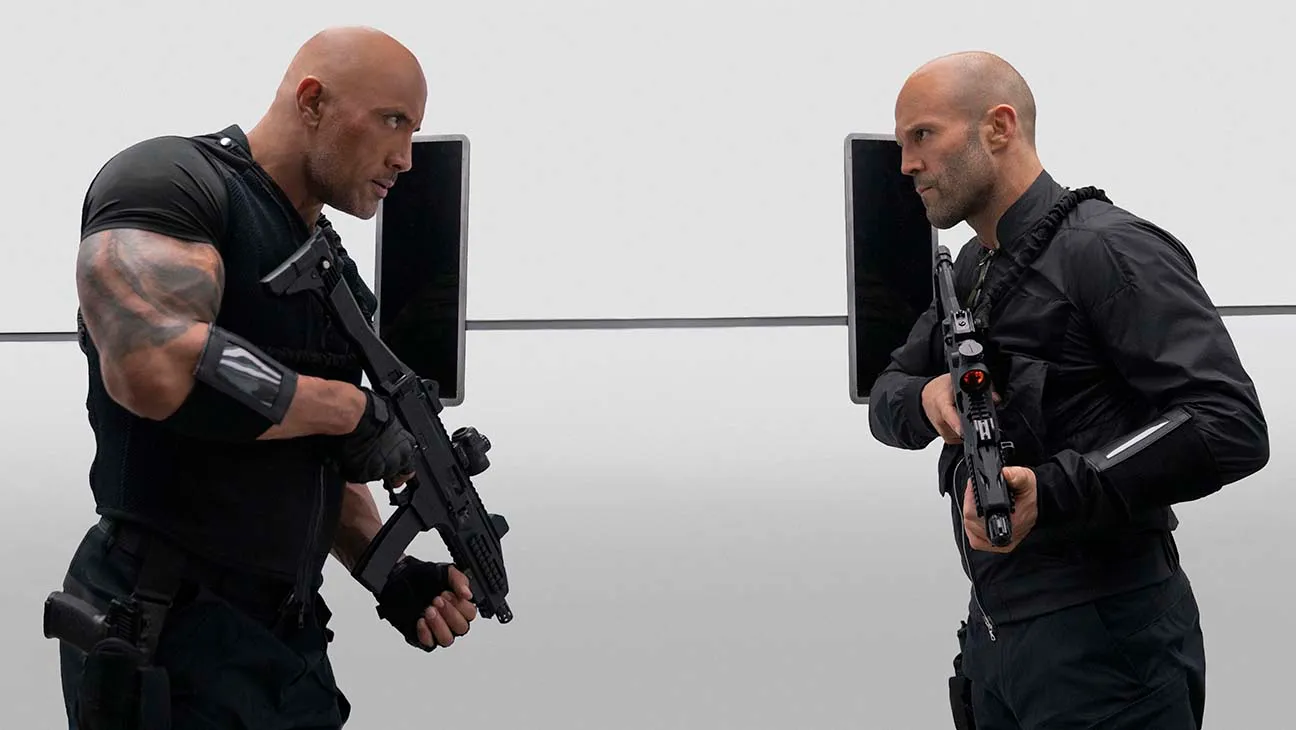
Dwayne Johnson’s Luke Hobbs embodies the quintessential action hero with a heart, using his impressive physicality and moral compass to guide his actions throughout the film. Johnson’s performance is layered with moments of vulnerability and tenderness, particularly in scenes that explore Hobbs’ relationship with his daughter and his estranged family in Samoa.
Jason Statham’s Deckard Shaw, with his cool demeanor and precision-driven approach to conflict, provides the perfect counterbalance to Hobbs’ more straightforward and forceful style. Their banter and evolving relationship provides much of the film’s humor and heart, underscoring the narrative with themes of reconciliation and familial bonds.
“Hobbs & Shaw” stands out for its ambitious action sequences, which include gravity-defying car chases, intense hand-to-hand combat, and a climactic battle in Samoa that showcases the power of community and ancestral wisdom.
The film’s global settings, from the neon-lit streets of London to the rugged terrains of Samoa, add a visually stunning backdrop to the adrenaline-fueled action. The inclusion of sophisticated technology and futuristic weaponry lends a sci-fi edge to the film, broadening the franchise’s traditional focus on street racing and vehicular heists.

Commercially, “Hobbs & Shaw” was a significant success, grossing over $759 million worldwide. It proved that the “Fast & Furious” universe has the potential to expand beyond the main storyline, offering audiences new characters and narratives to explore.
Critics praised the film for its action sequences, the chemistry between Johnson and Statham, and its effective balance of humor and heart. While some noted the plot’s predictability, the film’s entertainment value and character dynamics were widely celebrated.
8. “Rampage” (2018)
Rampage is a monstrous spectacle of a movie that blends the thrills of giant creature features with the charisma of its leading man, Dwayne Johnson.
Directed by Brad Peyton, with whom Johnson has previously collaborated on other action-packed projects like “San Andreas,” the film is loosely based on the 1980s video game of the same name. It cleverly transposes the game’s basic premise—giant animals wreaking havoc in urban environments—into a narrative that explores themes of genetic manipulation, environmental conservation, and the unbreakable bonds between humans and animals.
Dwayne Johnson stars as Davis Okoye, a primatologist and former Special Forces soldier who shares an unshakable bond with George, an albino silverback gorilla who becomes one of three animals affected by a rogue genetic experiment.
“Rampage” kicks off with a space station experiment gone wrong, resulting in canisters containing a pathogen crashing to Earth. When George, a wolf in Wyoming, and a crocodile in the Everglades are exposed to the pathogen, they grow to enormous sizes and become aggressively destructive.
Davis teams up with Dr. Kate Caldwell (Naomie Harris), a genetic engineer, to secure an antidote, hoping to save George and stop the other mutated animals from leveling Chicago in a spectacular showdown.
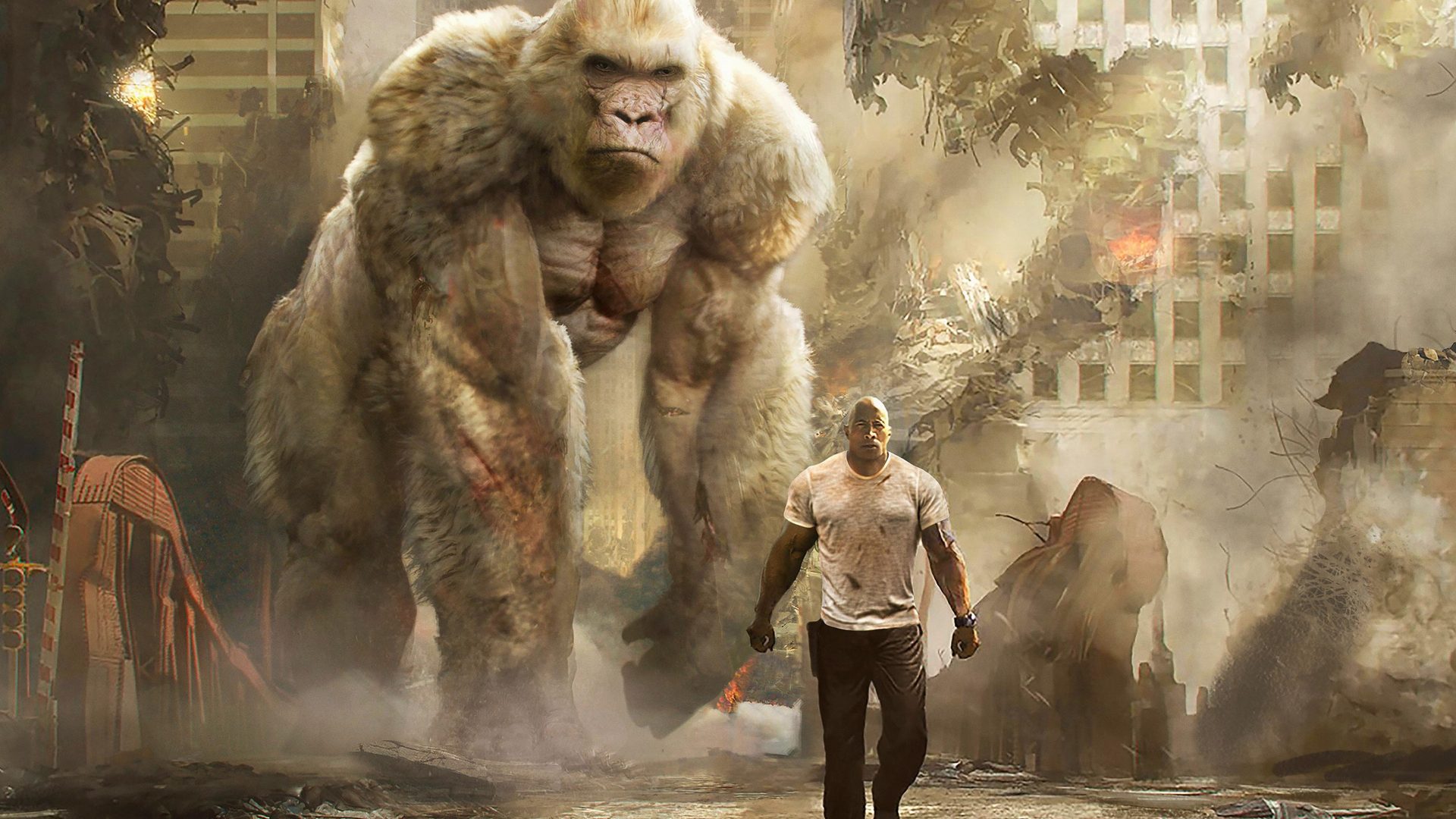
Dwayne Johnson’s performance is at the heart of “Rampage,” bringing depth and humanity to a film that could easily have been lost in its CGI spectacle. Johnson’s Davis Okoye is characterized by his unwavering loyalty to George, providing the emotional core that grounds the film’s more fantastical elements.
This relationship highlights Johnson’s ability to convey vulnerability and determination, traits that have become hallmarks of his film persona. His physicality is matched by a genuine warmth and sense of humor, making Davis a relatable and heroic figure amid the chaos.
The film’s action sequences are a sight to behold, showcasing Peyton’s skill at orchestrating large-scale destruction while maintaining a focus on the characters’ journey. The final battle in Chicago is particularly memorable, offering a thrilling mix of creature feature mayhem and heroic daring-do. The CGI creatures, especially George, are impressively realized, with motion capture technology adding a level of expressiveness that enhances the film’s emotional impact.
“Rampage” also delves into the ethical dilemmas surrounding genetic engineering and wildlife conservation, themes that add a layer of relevance to its blockbuster entertainment. While the film adopts a broad-strokes approach to these issues, it raises pertinent questions about human intervention in the natural world and the responsibility that comes with scientific advancement.

Commercially, “Rampage” was a success, grossing over $428 million worldwide. It resonated with audiences looking for a mix of heart-pounding action and heartwarming moments, further cementing Dwayne Johnson’s status as a bankable leading man capable of anchoring a wide range of projects. Critics praised the film for its visual effects, fast-paced action, and Johnson’s performance, though some noted the story’s predictability.
9. “Skyscraper” (2018)
Skyscraper emerges as a riveting action-thriller that scales new heights in Dwayne Johnson’s illustrious film career, presenting him in a role that combines vulnerability with his trademark heroic persona.
Directed by Rawson Marshall Thurber, who previously collaborated with Johnson on “Central Intelligence,” “Skyscraper” pays homage to classic disaster films and action-packed blockbusters like “Die Hard” and “The Towering Inferno,” while carving out its own identity within the genre.
Johnson stars as Will Sawyer, a former FBI Hostage Rescue Team leader and amputee who now assesses security for skyscrapers. The narrative thrusts Sawyer into a desperate battle against both flames and foes in the world’s tallest and most technologically advanced skyscraper, The Pearl, located in Hong Kong.
The film unfolds with Sawyer’s family trapped inside The Pearl, which becomes engulfed in flames due to a nefarious plot. With the building on fire and his family’s lives hanging in the balance, Sawyer is framed for the disaster.
What follows is a high-stakes quest to clear his name and save his loved ones, showcasing Johnson’s ability to navigate through intense action sequences and emotional depth.
The character of Will Sawyer marks a departure from Johnson’s typically invulnerable roles, presenting him as a relatable hero who must leverage his wit, willpower, and physical prowess to overcome seemingly insurmountable odds.
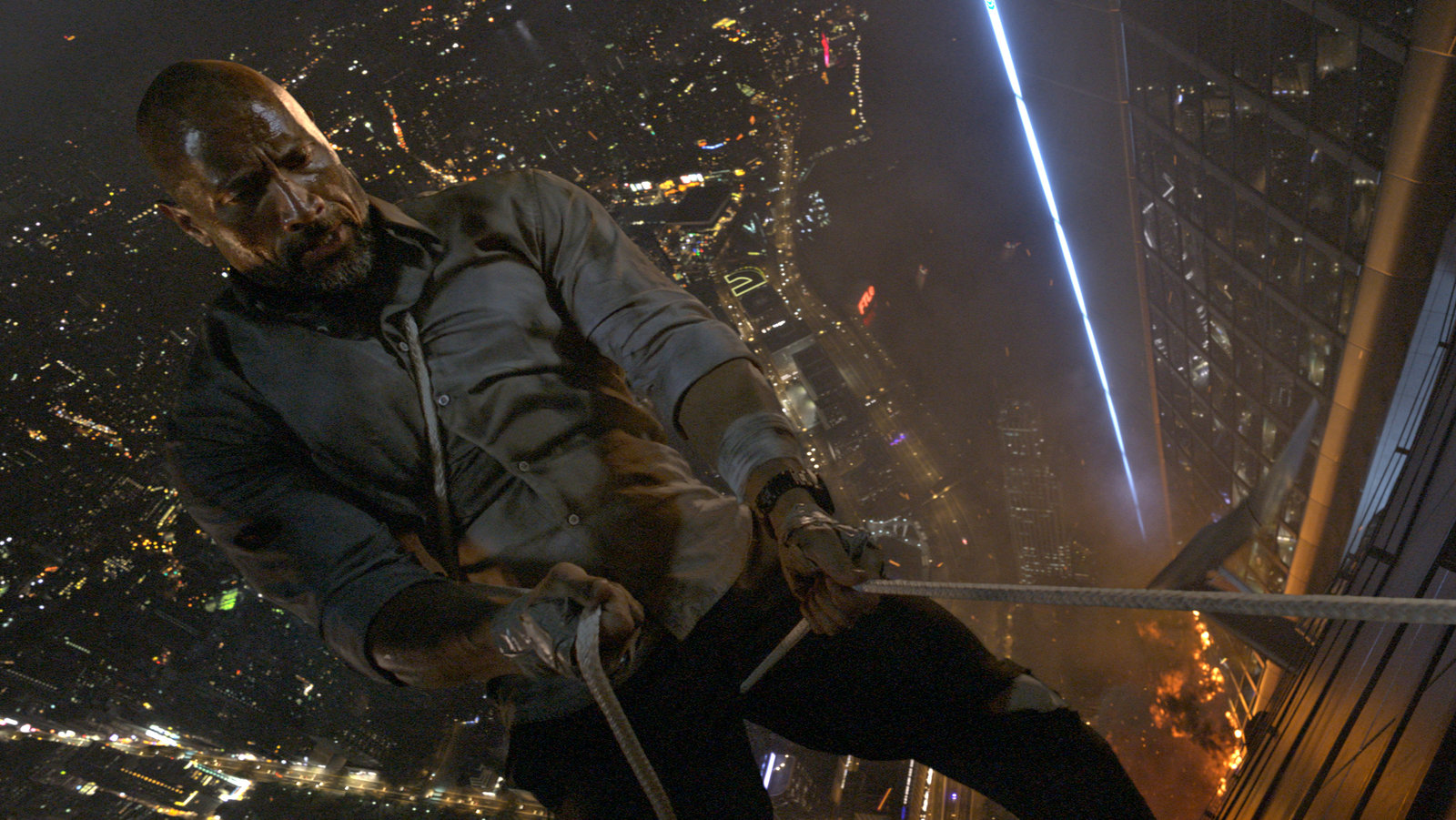
“Skyscraper” excels in its breathtaking visual effects and meticulously crafted set pieces, which include vertigo-inducing climbs and leaps that push the boundaries of suspense and excitement.
The design of The Pearl itself is a marvel, symbolizing human ambition and ingenuity while also serving as the arena for Sawyer’s battle against corruption and terrorism. The film’s action sequences are underpinned by themes of resilience, sacrifice, and the power of familial bonds, elevating it beyond mere spectacle.
Dwayne Johnson’s performance is central to the film’s impact, bringing a blend of physicality and emotional resonance to the role of Will Sawyer.
His portrayal of a determined father and husband fighting against overwhelming odds adds a layer of complexity to the character, making the audience’s investment in his journey all the more compelling. Johnson’s chemistry with his on-screen family, including Neve Campbell as his wife Sarah, enriches the narrative, grounding the high-flying action in a relatable struggle for survival and reunion.

Commercially, “Skyscraper” was a solid performer, showcasing Johnson’s global appeal and the universal allure of the action-thriller genre. While the film received mixed reviews from critics, who praised its visual effects and Johnson’s performance but critiqued its predictability and adherence to genre tropes, it managed to captivate audiences with its adrenaline-pumping action and heartfelt story.
10. “Baywatch” (2017)
Baywatch dives into the action-comedy genre with a splash, reimagining the iconic 90s television series for a new generation while infusing it with a modern sensibility and a hefty dose of humor.
Directed by Seth Gordon, known for “Horrible Bosses,” the film transplants the sun-soaked lifeguard saga from the small screen to the big screen, casting Dwayne Johnson in the lead role as the charismatic and dedicated Mitch Buchannon. Alongside a dynamic cast, including Zac Efron, Alexandra Daddario, and Priyanka Chopra, Johnson leads a team of lifeguards on a mission to protect their beach and uncover a criminal plot that threatens their bay.
“Baywatch” sets itself apart with its self-aware approach, embracing the original series’ campiness while delivering a contemporary twist on the lifeguard drama. Johnson’s Mitch Buchannon is the heart and soul of the Baywatch team, embodying the qualities of leadership, courage, and moral integrity that defined the television series.
However, the film injects a new dynamic with the introduction of Matt Brody (played by Zac Efron), a disgraced Olympic swimmer who joins the lifeguard squad as part of a plea deal. The interplay between Johnson and Efron provides much of the film’s comedic backbone, with their characters’ contrasting personalities and approaches to lifeguarding creating a fertile ground for humor and growth.

At its core, “Baywatch” is a story about teamwork, redemption, and the unglamorous side of heroism. The lifeguards’ investigation into the criminal activities led by the villainous Victoria Leeds (Priyanka Chopra) showcases their commitment to their community, challenging the perception of lifeguards as mere beach adornments.
The film navigates through action-packed rescue missions, undercover operations, and high-speed chases, all set against the picturesque backdrop of the sun-drenched beach, which serves as both a character and battleground in the narrative.
Dwayne Johnson’s performance anchors the film, bringing a balance of earnestness and levity to the role of Mitch Buchannon. His ability to oscillate between action hero and comedic lead ensures that “Baywatch” maintains a brisk pace and a light-hearted tone, even as it delves into themes of crime and corruption.
Dwayne Johnson’s chemistry with the ensemble cast, including the mentorship dynamic with Efron’s character and the camaraderie with fellow lifeguards, underscores the film’s message about the importance of community and collective action.

Commercially, “Baywatch” enjoyed moderate success, demonstrating the enduring appeal of the franchise and Johnson’s star power. While the film received mixed reviews from critics, who praised its cast’s performances but criticized its uneven tone and pacing, it found a receptive audience among fans of the original series and viewers seeking a blend of comedy, action, and nostalgia.
In conclusion
The exploration of Dwayne Johnson’s diverse and impactful roles across ten of his most notable films reveals not only his versatility as an actor but also his ability to elevate each project with his unique blend of charisma, physicality, and depth.
From the fantastical realms of “Moana” and the comedic action of “Central Intelligence,” to the intense disaster drama of “San Andreas” and the high-stakes world of “Fast & Furious” in “Furious 7” and “Hobbs & Shaw,” Johnson’s filmography is a testament to his wide-ranging appeal and talent.
Each film, whether it leans more towards action, comedy, or family-oriented narratives, benefits significantly from Johnson’s presence, underscoring his status as a bankable star who brings both emotional depth and box office success to his projects.
The articles delve into the essence of what makes each movie stand out, highlighting not only Johnson’s performance but also the themes, narrative structures, and cinematic qualities that define them.
From the heartfelt journey of self-discovery in “Moana” to the adrenaline-fueled action of “Furious 7” and the innovative disaster spectacle of “San Andreas,” Johnson’s roles contribute to and often transcend the genres they inhabit.
His ability to connect with the audience, whether through humor, empathy, or sheer willpower, is a recurring theme that enhances the cinematic experience, making his films memorable and engaging.
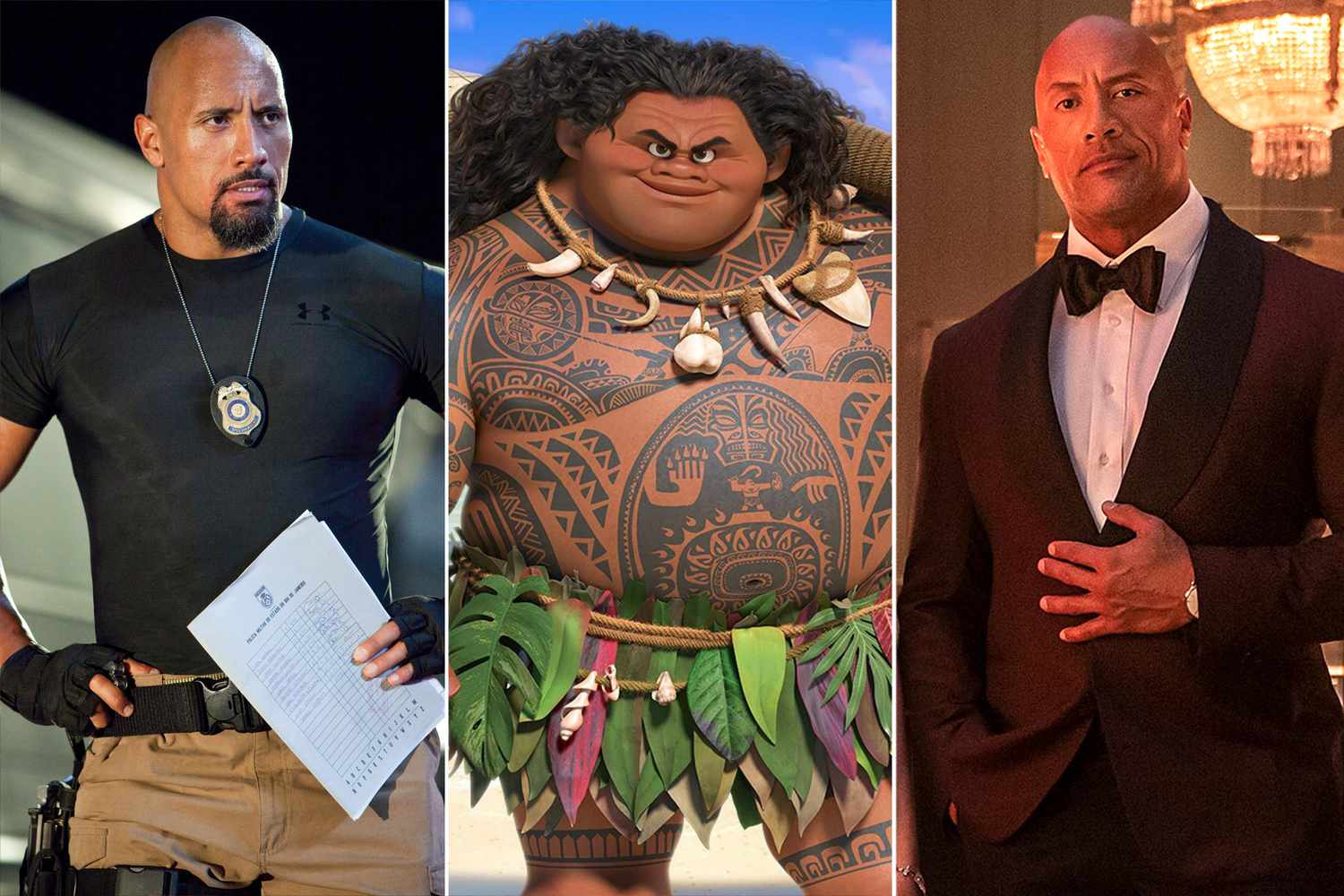
Dwayne Johnson’s journey through these ten films showcases a career that is both varied and influential. Through roles that challenge and embrace his capabilities, Johnson has become more than just an action star; he is a multifaceted performer whose work resonates with a broad spectrum of viewers.
His impact on the film industry extends beyond the characters he portrays, embodying a work ethic, charisma, and dedication to entertainment that sets him apart. As he continues to take on new projects and challenges, Johnson’s filmography will undoubtedly remain a testament to his talent, versatility, and enduring appeal as one of Hollywood’s most beloved actors.


